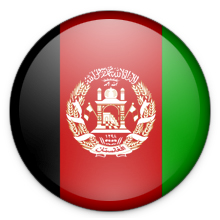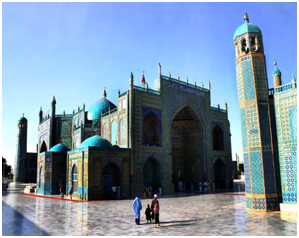Afghanistan- Language, Culture, Customs and Etiquette
Facts and Statistics
Location : Southern Asia, north and west of Pakistan, east of Iran
Capital : Kabul
Climate : Arid to semiarid; cold winters and hot summers
Population : 29,928,987 (July 2005 est.)
|
|
Ethnic Make-up : Pashtun 42%, Tajik 27%, Hazara 9%, Uzbek 9%, Aimak 4%, Turkmen 3%, Baloch 2%, other 4%
Religions : Sunni Muslim 80%, Shi'a Muslim 19%, other 1% |
| |
|
Afghan Culture & Society
Islam
-
Islam is practised by the majority of Afghanis and governs much of their personal, political, economic and legal lives.
-
Among certain obligations for Muslims are to pray five times a day - at dawn, noon, afternoon, sunset, and evening.
-
Friday is the Muslim holy day. Most shops and offices will be closed. Government offices and businesses may also close on Thursday, making the weekend Thursday and Friday.
-
During the holy month of Ramadan all Muslims must fast from dawn to dusk and are only permitted to work six hours per day. Fasting includes no eating, drinking, cigarette smoking, or gum chewing.
-
Foreigners are not required to fast; however, they must not eat, drink, smoke, or chew gum in public.
|
|
The Ethnic Make-up and Tribes
- Afghanistan is a vast country and as a result has a rich mix of ethnicities and tribes.
- The Pashtun are Sunni Muslims who Pashtu. They constitute around 42% of the population and are concentrated in Nangrahar and Pakhtya provinces. A large population also live in neighbouring Pakistan.
- Tajiks comprise roughly 27% of the population. They are Iranian in origin and speak a form of Persian found in Eastern Iran. Most are Sunni Muslim. Most reside in Kabul and Herat provinces,although some reside in the mountains north of Hindu Kush, and the Iranian border.
- Hazaris make up about 9% of the population. They are descendants of the Mongols, and speak a dialect of Persian that contains many Turkish words. They are also Shiite Muslims which led to much of their persecution under Taliban rule. Most live in the Hazarajat region.
- Uzbeks live in the northern parts of the country and also comprise only 9% of the population. They are Sunni Muslims and speak a dialect of Turkish.
- The Turkomen are a small minority with making only 3% of the population.
- Baluchis are pastoral nomads who speak Baluchi, an Iranian language. They comprise 2% of the population.
The Family
- The family is the single most important unit in the Afghan culture.
- Men and women's roles are much more defined along traditional lines.
- Women are generally responsible for household duties, where as men will be the bread winners. In the cities professional women do exist.
- Families commonly arrange marriages for their children. Factors such as tribe, status, network, and wealth are the major factors forming any choice.
- Families traditionally live together in the same walled compound, known as the kala. When a son gets married he and his wife begin their married lives in a room under the same roof.
- As with much of the Muslim world, the family is sacred and as such, is highly protected. As a result, probing about the family is not advised.
The Concepts of Honour and Shame
- Honour in Afghan culture defines the reputation and worth of an individual, as well as those they are associated with.
- The head male of a family is responsible for protecting the honour of the family.
- The issue of honour drives much of the behaviour surrounding the protection of women, modes of dress, social interaction, education and economic activity.
- If someone's honour has been compromised, they are shamed and will look for a way to exact revenge for themselves, their family or group.
- The role of honour and tribalism has fuelled much of the disharmony in the country's recent history - with one group carrying out violent acts against another, the victims are forced to respond causing a circle of violence.
The Role of Hospitality
-
Hospitality is an essential aspect of Afghan culture.
-
No matter who you are, if you visit a home you will be given the best the family has.
-
This relates back to the idea of gaining honour.
-
If you are invited for tea, which you inevitably will be, you will be offered snacks and your tea glass will be constantly filled. When you have had enough cover the glass with your hand and say "bus" (meaning 'enough').
Social Etiquette, Customs and Protocol
Meeting and Greeting
- When meeting someone the handshake is the most common form on greeting. You will also see people place their hands over their hearts and nod slightly.
- One should always enquire about things like a person's health, business, family, etc.
- Women and men will never shake hands let alone speak directly to one another.
- Eye contact should also be avoided between men and women. Between men eye contact is acceptable as long as it is not prolonged - it is best to only occasionally look someone in the eyes.


